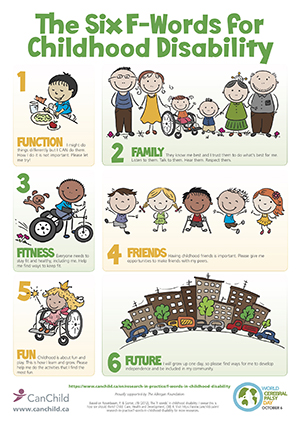The 'F-words' in Childhood Disability, a Paradigm Shift (MN LEND)
December 7, 2017

|
| Download |
|
|
The University of Minnesota's LEND Program hosted keynote speaker Dr. Peter Rosenbaum, M.D., FRCP on November 16, 2017 at the Wesiman Art Museum. His talk centered on the "'F-words' in Childhood Disability". Dr. Rosenbaum spoke to a full auditorium about the importance to reassess our assumptions as healthcare providers toward treating childhood disabilities.
He suggested that traditional "tyrannies" are built into system such as existing training focused on diagnosing and treating. He suggested that our modus operandi is to that "'fix' the problem by resulting to "biomedical interventions and Rx". He stated that we are so concentrated on "trying to get to normal and then ending at disability and handicap" that we miss the most important part, the development of the child. Dr. Rosenbaum noted that this existing system is laden with negative connotations and debilitating effects on the child, the family and society as a whole. He suggested what is required is a paradigm shift, and we need ideas that promote childhood development which focus on the strengths and achievements of the child and the family. He promotes more person-center and family-center focus and services. Dr. Rosenbaum stated, "so much of what we want to share must start with a family's earliest introduction to the world of disability". From the CanChild website are the "Six 'F-words' in Childhood Disability: Function: defined as role, job, task (for children play); Family: critical environment (of all children); Fitness: physical activity or recreational opportunities; Fun: activities children enjoy participating in; Friends: friendships created with peers; social development; Future: parent's and child's expectations and dreams for their future".
In the presentation, Dr. Rosenbaum reveals the foundation of the 'F-words' building on that of the World Health Organizations' (WHO's) International Classification of Functioning, Disability and Health (ICF) framework. Both use 'holistic approach' that concentrates on six very similar areas that are important to childhood development. In addition, the (ICF) replaces the traditional ideologies. Dr. Rosebaum's statement validates this concept, "This is consistent with developmental realities: kids first learn to do things in their own way, and then (maybe) they develop good skills in those activities This moves us toward 'achievement' and away from 'normal' as the main goal". The literature, on the website CanChild "'F-word' in Childhood Disability", points out that it is important to note that of the "Six 'F-word'" areas, "no one factor is more important than the other"; that they are equally important to the development of the child. Dr. Rosenbaum ended the presentation with informing us that it is our responsibility to be 'Knowledge Brokers' by helping to educate others such as policy-makers, community leader, members of various boards and programs to understand this new way of thinking, this paradigm shift into the 21st century.
As a result of the event, Senior RN Consultant Asli Ashkir at the MN State Department of Health is working alongside LEND Fellows Yusuf Samatar and Deeqifrah Hussein to translate the "Six-'F Words' in Childhood Disability Poster" into Somali for the guest speaker Dr. Peter Rosenbaum's CanChild Centre at McMaster University in Hamilton University. LEND Fellow Pang Chaxiong and ICI's RTC student worker Isabella Xiong are also collaborating to translate the same poster into Hmong.







